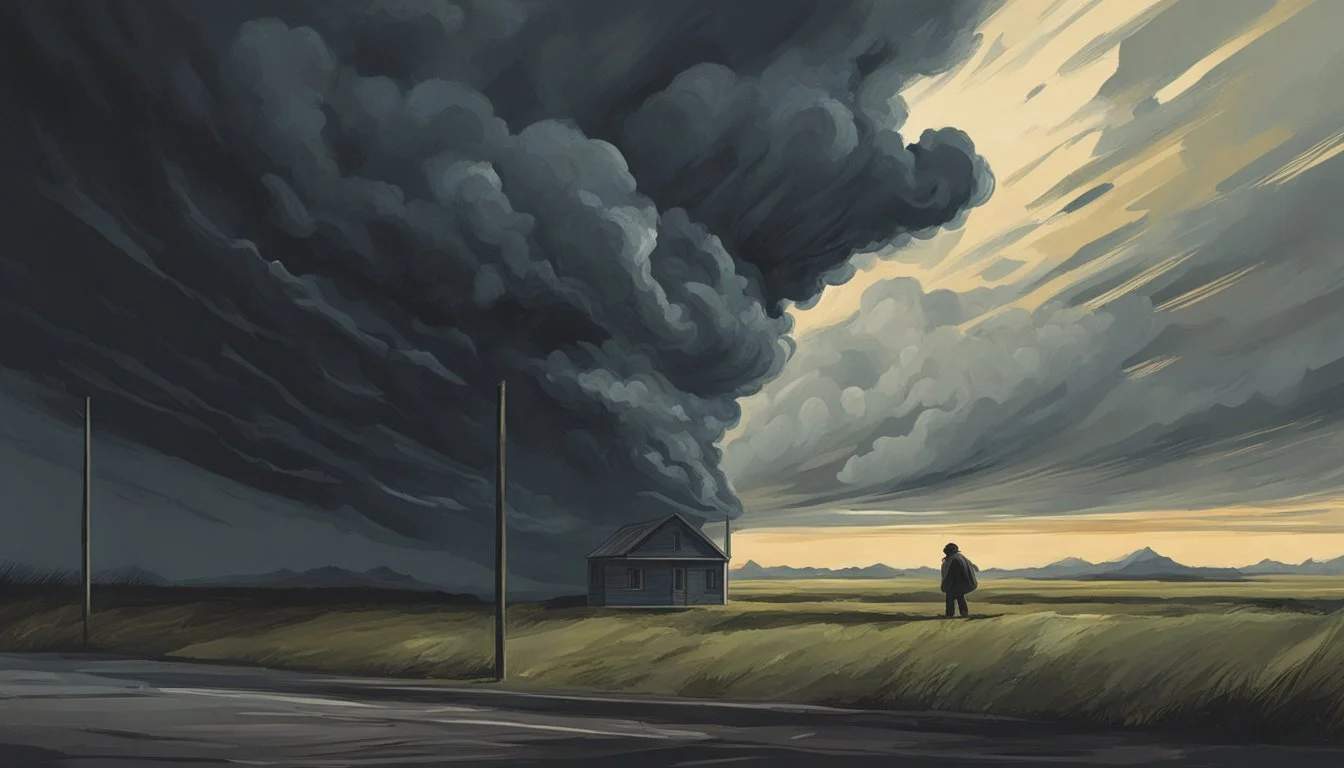14 Quotes That Capture the Experience of Living with PTSD
Insights and Reflections
Living with PTSD is a profound and complex experience that affects millions worldwide. It encompasses a wide array of emotions and challenges, often leaving individuals feeling isolated and misunderstood. Quotes that capture these experiences can provide both insight and solace for those navigating the journey of post-traumatic stress disorder.
Understanding the nuances of PTSD is crucial for fostering empathy and support within communities. Through the words of various authors and thinkers, the intricacies of this condition are illuminated, offering a deeper comprehension of the resilience and struggles faced by those affected.
1) "The greatest glory in living lies not in never falling, but in rising every time we fall." - Nelson Mandela
This powerful quote by Nelson Mandela highlights the resilience needed in life. It speaks directly to those living with PTSD, who face challenges and setbacks regularly. The essence of the quote is the importance of perseverance and the ability to get back up after every fall.
Living with PTSD often includes moments of intense struggle and feeling overwhelmed. Mandela’s words remind individuals that these struggles do not define them. Instead, their strength and recovery after each episode demonstrate their true character.
The focus is not on avoiding setbacks but on the courage to rise again. This perspective encourages a shift from viewing failures as defeat to seeing them as opportunities for growth. For anyone with PTSD, this mindset can be empowering and motivating.
The quote also emphasizes the value of resilience in personal development. The ability to recover and continue moving forward is a testament to inner strength. For those experiencing the challenges of PTSD, Mandela’s words offer hope and encouragement.
Drawing from this inspirational message helps instill a sense of determination and purpose. Each recovery from a setback becomes a victory, reinforcing the idea that rising every time one falls is a significant achievement.
2) "You may encounter many defeats, but you must not be defeated." - Maya Angelou
"You may encounter many defeats, but you must not be defeated," is a powerful quote by poet and civil rights activist Maya Angelou. This phrase speaks directly to the resilience needed to live with PTSD.
Angelou's words emphasize that experiencing setbacks does not define a person. Instead, these challenges can build strength and endurance.
PTSD can bring numerous difficulties, but this quote encourages individuals to persevere. It underscores the importance of rising above personal defeats and continuing to strive for healing.
These words remind those living with PTSD that their struggles do not determine their worth. Despite the hardships, it is possible to emerge stronger and more resilient.
Angelou's message is a beacon of hope, reinforcing that persistence in the face of adversity is crucial. It aligns with the journey of many who live with PTSD, offering reassurance and motivation.
For more, you can view this quote on A-Z Quotes.
3) "PTSD is a whole-body tragedy, an integral human event of enormous proportions with massive repercussions." - Susan Pease Banitt
Susan Pease Banitt's quote poignantly highlights the profound impact of PTSD. PTSD affects not just the mind but the entire body. Trauma can trigger physical symptoms alongside psychological ones, underscoring the condition's complexity.
PTSD’s effects are far-reaching, often disrupting daily life. Sufferers may experience flashbacks, anxiety, and depression, making even simple tasks daunting. The repercussions radiate outward, affecting relationships and work.
Banitt emphasizes the enormity of PTSD. It’s a condition that can reshape a person's life. Recognizing the comprehensive nature of PTSD is crucial for effective treatment and support, illuminating the path towards healing and understanding.
For more on Banitt's perspective on PTSD, you can visit her Goodreads quotes.
4) "Healing takes time, and asking for help is a courageous step." - Mariska Hargitay
Healing from PTSD is a gradual process. Mariska Hargitay emphasizes that healing takes time and asking for help is a courageous step. This perspective is crucial for those who feel overwhelmed by their symptoms.
Acknowledging the need for support demonstrates strength. Reaching out can be challenging, yet it marks the beginning of recovery. Seeking professional help or confiding in trusted individuals can make a significant difference.
It’s essential to be patient with oneself. Progress may be slow and nonlinear. Taking small, manageable steps toward healing helps maintain a positive outlook. Regularly reminding oneself that asking for help is brave encourages continued efforts.
5) "Sometimes the smallest step in the right direction ends up being the biggest step of your life." - Naeem Callaway
Living with PTSD can feel overwhelming, and even taking a small step forward seems daunting. Naeem Callaway reminds individuals that these seemingly minor actions can lead to significant changes.
A small yet meaningful step could be as simple as opening up to a trusted friend or attending a therapy session. These actions, while modest, can create a ripple effect leading to bigger improvements in one's life.
Sometimes, it's about finding the courage to seek help or trying a new coping mechanism. These small steps help build confidence and pave the way for substantial progress in managing PTSD.
For more inspiration from Callaway's work, his quote is featured on Tiny Buddha and Goodreads.
6) "There is no standard normal. Normal is subjective. There are seven billion versions of normal on this planet." - Matt Haig
Matt Haig's quote highlights a crucial truth about human experience: normalcy is diverse. Individuals often struggle with PTSD, feeling isolated or "abnormal." Haig's words remind us that each person's experience is valid.
PTSD can make sufferers feel alienated. Haig’s statement speaks directly to this, suggesting that everyone's version of normal is unique. There is no single standard to measure against.
This perspective is liberating for those with PTSD. It encourages acceptance of one's own journey without comparison. The notion that there are seven billion versions of normal underscores the individuality of each life experience.
Such insights are vital in mental health discourse. They provide comfort and validation, fostering a more inclusive understanding of normalcy.
7) "Trauma is hell on earth. Trauma resolved is a gift from the gods." - Peter A. Levine
Peter A. Levine's quote succinctly expresses the duality of trauma and healing. Experiencing trauma can feel like enduring a nightmare. The emotional and psychological toll is immense, likening it to living through a personal hell.
Resolving trauma, on the other hand, is described as a divine gift. The process of overcoming such distress can lead to profound personal growth and transformation. This dichotomy highlights the potential for recovery to bring about a sense of peace and renewal.
Levine, a renowned expert in trauma therapy, encapsulates the arduous journey of suffering and the rewarding outcome of healing in his words. His insight underscores the importance of addressing and working through trauma for achieving emotional well-being.
His quote also emphasizes the necessity of resilience and resources. Effective interventions and support systems play crucial roles in transforming traumatic experiences into opportunities for growth. By facing trauma head-on, individuals can eventually uncover inner strength and resilience.
For more insights from Peter A. Levine, visit A-Z Quotes.
8) "The world breaks everyone, and afterward, many are strong at the broken places." - Ernest Hemingway
Ernest Hemingway's quote, "The world breaks everyone, and afterward, many are strong at the broken places," encapsulates resilience and recovery. People who live with PTSD often feel broken by their experiences. The quote suggests that healing and strength can emerge from these broken places.
PTSD can shatter one's sense of self. Survivors may struggle with memories, emotions, and a sense of vulnerability. Hemingway's words acknowledge this breaking while offering hope that these fractures can be sites of newfound strength.
Recovery from PTSD is challenging. The journey involves confronting painful memories and developing coping mechanisms. The idea that broken places can become strong aligns with the process of building resilience.
Hemingway's quote speaks to the human capacity for healing after trauma. It presents a realistic yet hopeful perspective, emphasizing that strength often arises from the most painful experiences. The quote is frequently associated with the idea that individuals can rebuild themselves, often becoming stronger than before.
For more details on the quote, visit Goodreads or explore What Should I Read Next. These platforms offer further insights into Hemingway's reflections on resilience.
9) "It's not the load that breaks you down, it's the way you carry it." - Lou Holtz
Navigating life with PTSD is profoundly challenging. Lou Holtz’s quote, "It’s not the load that breaks you down, it’s the way you carry it," resonates deeply with those facing this reality.
PTSD involves carrying a weight of experiences and emotions that can feel unwavering. Holtz’s words emphasize the importance of approach and mindset in managing such burdens.
For individuals with PTSD, the journey involves finding coping mechanisms that can effectively aid in managing their symptoms. This might include therapy, support groups, or medication.
The way one chooses to carry their load can make a significant difference. Understanding and accepting the need for support can transform this burden into something more manageable.
Holtz’s quote also underscores the significance of resilience. It's a reminder that strength lies not just in enduring difficult situations but in adapting and finding ways to bear them more effectively.
Holtz's wisdom shows that the struggles of PTSD are not insurmountable. By adjusting how one carries their burdens, the path to healing, though difficult, becomes attainable.
10) "I'm not a product of my circumstances. I am a product of my decisions." - Stephen R. Covey
Stephen R. Covey's quote highlights the power of personal agency in shaping one's life. For individuals living with PTSD, this message can serve as an influential reminder.
PTSD can make it feel like one’s life is controlled by past traumas. However, Covey's words suggest that it's the choices people make in response to these circumstances that define their lives.
The quote underscores the importance of taking proactive steps toward healing and recovery. By focusing on decisions rather than circumstances, individuals with PTSD can find a sense of empowerment.
Support systems, therapy, and positive coping mechanisms are decisions that can significantly impact their healing journey. Covey's perspective encourages considering these actions as pivotal parts of the recovery process.
This mindset can be foundational in achieving a measure of control and restoration, promoting a pathway to better mental health and well-being. The idea is not to downplay the severity of trauma but to emphasize the role of personal choice in managing its impact.
For many, embracing this philosophy can lead to transformative changes, reinforcing the belief that the future is shaped by the decisions made today.
11) "Believe in yourself and all that you are. Know that there is something inside you that is greater than any obstacle." - Christian D. Larson
Christian D. Larson's quote emphasizes self-belief and inner strength. Living with PTSD can feel overwhelming, but this quote serves as a powerful reminder that resilience resides within.
The message encourages individuals to trust in their capabilities. Even when faced with severe challenges, the inner spirit and determination can help navigate through difficult times.
This quote can provide solace and motivation. It invites those struggling with PTSD to recognize their potential and inner strength, offering a glimmer of hope and the courage to continue facing life’s obstacles.
For more inspirational words from Christian D. Larson, you can visit A-Z Quotes. His timeless wisdom offers continuous support for those seeking guidance and encouragement.
12) "In the midst of winter, I found there was, within me, an invincible summer." - Albert Camus
Albert Camus's quote, "In the midst of winter, I found there was, within me, an invincible summer," eloquently encapsulates inner resilience. For individuals living with PTSD, this metaphor emphasizes the strength they possess internally, even when external conditions feel cold and harsh.
Each winter represents the challenging periods filled with emotional turmoil and distress.
Despite these struggles, the "invincible summer" symbolizes a core of unwavering strength. This inner fortitude helps individuals to push forward and endure. It highlights that there is a part within them that remains unaffected by the surrounding difficulties.
This quote also conveys hope and positivity during dark times. It serves as a powerful reminder that even when everything seems bleak, an internal reservoir of courage and hope remains accessible.
Such affirmations can provide comfort and encouragement to those facing the many challenges of PTSD.
For more insights on Camus's poetic reflections, visit Polly Castor or explore related quotes on Goodreads.
13) "Owning our story and loving ourselves through that process is the bravest thing that we'll ever do." - Brené Brown
Brené Brown's quote speaks to the heart of self-acceptance and healing. For individuals living with PTSD, acknowledging one's experiences can be a formidable task. It requires courage to confront past traumas and the persistent effects they have on daily life.
Owning one's story means embracing every part of one's journey, including the difficult moments. This honesty is vital for healing. By facing their truth, individuals can begin to break the chains that PTSD places on their lives.
Loving oneself through the process is equally important. Self-compassion can help individuals avoid self-blame and guilt. It fosters a nurturing mindset that is essential for recovery and resilience. The journey to self-love might be long, but it is a crucial step in overcoming PTSD.
Brené Brown’s insight underscores the importance of bravery in the healing process. Embracing one's story and practicing self-love aren't just acts of courage; they are essential for growth and recovery. Each small step toward self-acceptance is a victory in itself.
14) "Courage does not always roar. Sometimes courage is the quiet voice at the end of the day saying, 'I will try again tomorrow.'" - Mary Anne Radmacher
Mary Anne Radmacher's quote captures an essential truth about courage, especially for those living with PTSD.
The struggle with PTSD often involves quiet moments of resilience. There are days when every small step feels monumental. The strength needed to face another day can be overwhelming.
In this context, courage doesn't mean making bold, loud declarations. Instead, it is the persistent whisper of hope and determination.
The phrase "I will try again tomorrow" embodies a daily commitment to healing. It's about enduring the quiet battles within one's mind. Radmacher’s words offer a comforting reminder. They validate the silent, daily acts of bravery involved in living with PTSD.
Her quote resonates deeply. It acknowledges the underestimated power of quiet persistence and the importance of self-affirmation.
This perspective is crucial, as it allows for a more compassionate understanding of courage. For many with PTSD, the mere act of continuing each day is an act of courage worthy of recognition.
Understanding PTSD
Post-Traumatic Stress Disorder (PTSD) is a mental health condition triggered by experiencing or witnessing a traumatic event. The disorder manifests through various symptoms that can severely impact daily life.
What is PTSD?
PTSD stands for Post-Traumatic Stress Disorder. It arises after an individual experiences or witnesses a life-threatening or deeply disturbing event, such as combat, natural disasters, serious accidents, or violent personal assaults.
People with PTSD may relive the traumatic event through intrusive memories, flashbacks, or nightmares. These experiences can set off physical and emotional reactions, making it difficult for the person to function in daily activities. PTSD is not merely an emotional or psychological issue. It involves intricate changes in brain function and structure. A combination of therapy, medication, and support systems is often essential to manage and alleviate symptoms.
Common Symptoms
PTSD symptoms fall into four main categories: intrusive memories, avoidance, negative changes in thinking and mood, and changes in physical and emotional reactions.
Intrusive Memories: These include recurrent, unwanted distressing memories of the traumatic event, flashbacks, and nightmares.
Avoidance: Avoiding places, activities, or people that remind the person of the traumatic event.
Negative Changes in Thinking and Mood: This can manifest as negative thoughts about oneself or others, hopelessness, memory problems, and difficulty maintaining close relationships.
Changes in Physical and Emotional Reactions: This includes being easily startled or frightened, always being on guard for danger, self-destructive behavior, trouble sleeping, and issues with concentration.
Symptoms can vary over time and from person to person, often triggered by stress or reminders of the trauma. Recognizing these symptoms is crucial for seeking appropriate treatment and support.
Living with PTSD
Living with PTSD involves dealing with a range of daily challenges and finding effective coping mechanisms to manage symptoms. These can greatly affect one's quality of life and interactions with others.
Daily Challenges
Individuals with PTSD often face numerous daily challenges. Flashbacks and intrusive thoughts can disrupt daily activities, making it difficult to maintain focus. Hypervigilance can lead to exhaustion due to a constant state of alertness.
Sleep disturbances are common, leading to fatigue and affecting cognitive function. Nightmares might interrupt rest, adding to the exhaustion.
Relationships may also suffer, with PTSD symptoms causing difficulties in communication and emotional closeness. Social withdrawal can lead to isolation, further exacerbating feelings of loneliness and despair.
Coping Mechanisms
Effective coping mechanisms are crucial for managing PTSD. Mindfulness and meditation can help individuals stay grounded and reduce anxiety. Techniques such as deep breathing and progressive muscle relaxation are useful in managing immediate stress reactions.
Engaging in physical activity can also be beneficial, as exercise helps in releasing endorphins, improving mood, and reducing stress. Keeping a consistent routine can provide a sense of normalcy and control.
Talking to a therapist or joining support groups provides a network of understanding and companionship. Professional guidance through therapies like Cognitive Behavioral Therapy (CBT) and Eye Movement Desensitization and Reprocessing (EMDR) can significantly help in addressing the root causes and symptoms of PTSD.
Support and Resources
Living with PTSD can be challenging, but numerous resources are available to help individuals find professional assistance and community support. Accessing these services can make a significant difference in recovery and management.
Finding Help
Professional assistance is crucial for anyone dealing with PTSD. Licensed therapists, particularly those specializing in trauma, offer therapies like Cognitive Behavioral Therapy (CBT) and Eye Movement Desensitization and Reprocessing (EMDR), both proven effective for PTSD.
Hotlines are also available for immediate help. Organizations such as the National Center for PTSD provide resources and support contacts for veterans and civilians alike.
Online directories, like the one available at Psychology Today, allow individuals to find therapists based on location, specialization, and insurance acceptance. These services streamline the process of connecting with professionals who can offer the guidance and treatment needed for managing PTSD symptoms effectively.
Community Support
Engaging in support groups can provide a sense of community and understanding. Groups like those organized by The Mighty connect individuals facing similar challenges, fostering a supportive and empathetic environment.
Online forums and social media groups are additional outlets where individuals can share experiences and advice anonymously if they prefer. Websites like Reddit's PTSD subreddit offer peer support and information sharing.
For those looking to actively participate in recovery workshops and retreats, organizations such as The Wellness Society offer programs focused on healing and personal development. These structured environments provide tools and strategies that complement traditional therapies, enhancing the recovery process.















